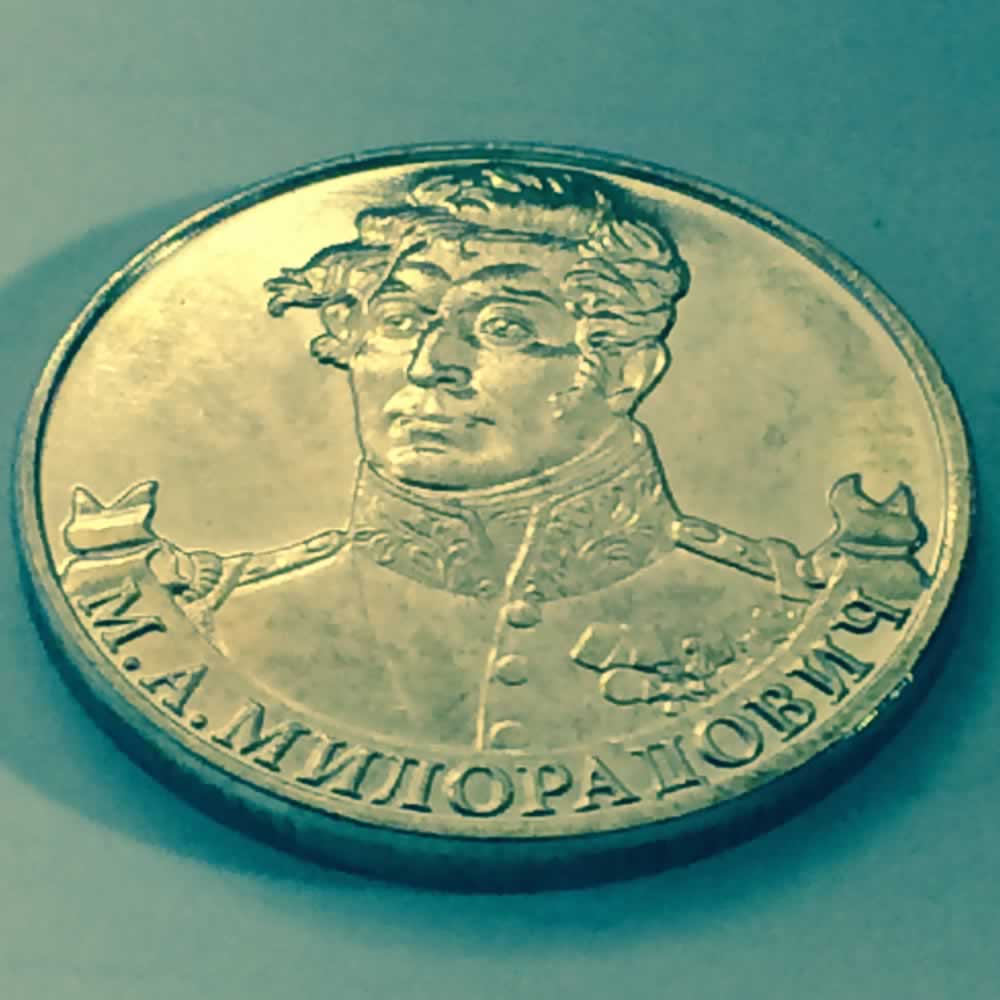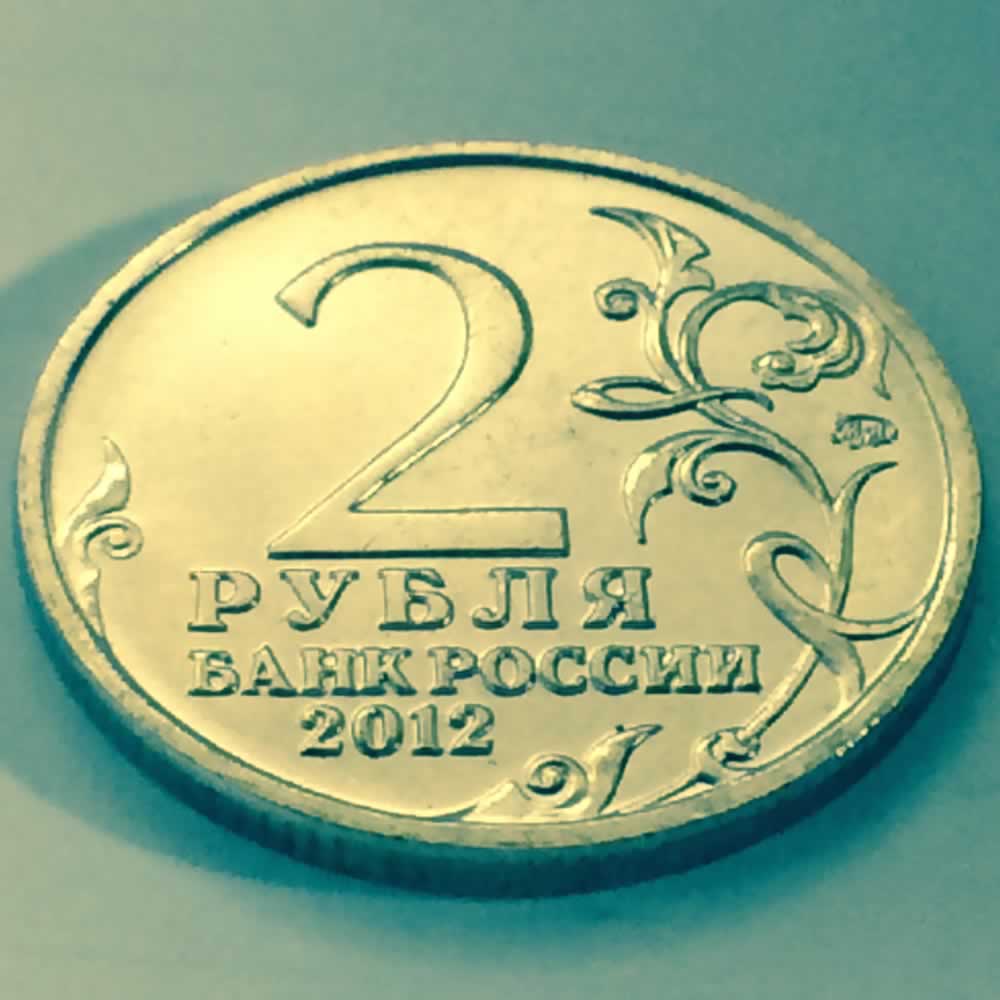200th Anniversary of the Victory in Patriotic War of 1812 - Military Leaders and Heroes Series - Field Marshal Barclay de Tolly
Country: Russia
Year: 2012
Value: 2 Roubles (2 RUB = 0.06 USD)
Metal: Nickel plated Steel
Weight: 5 g
Diameter: 23 mm
Thickness: 1.8 mm
Engravers: MIXED (obverse) A. V. Baklanov, A. I. Molostov (reverse)
Shape: Round
Orientation: Medal alignment ↑↑
Obverse: MIXED
Lettering: MIXED
Reverse: Denomination, ornament.
Lettering: 2 РУБЛЯ БАНК РОССИИ 2012
Edge: Segmented reeding
REF
Coin set, 2 roubles 2012, Russia, Warlords, 16 coins
1. M.I. Kutuzov, Field Marshal
2 roubles 2012 Russia Kutuzov, MMD
Mikhail Illarionovich Golenishchev-Kutuzov (Russian: князь Михаил Илларионович Голенищев-Кутузов; 16 September [O.S. 5 September] 1745 – 28 April [O.S. 16 April] 1813) was a Field Marshal of the Russian Empire. He served as one of the finest military officers and diplomats of Russia under the reign of three Romanov Tsars: Catherine II, Paul I and Alexander I. His military career was closely associated with the rising period of Russia from the end of the 18th century to the beginning of the 19th century. Kutuzov contributed much to the military history of Russia and is considered to have been one of the best Russian generals under the reign of Catherine II. He took part in the suppression of the Bar Confederation's uprising, in three of the Russo-Turkish Wars and in the Napoleonic War, including two major battles at Austerlitz and the battle of Borodino.
2. M.B. Barclay de Tolly, Field Marshal
Russia, 2 roubles 2012 Barclay de Tolly, MMD
Prince Michael Andreas Barclay de Tolly (27 December [O.S. 16 December] 1761 – 26 May [O.S. 14 May] 1818), was a Russian Field Marshal and Minister of War during Napoleon's invasion in 1812 and War of the Sixth Coalition.
3. P.I. Bagration, General of Infantry
2 roubles 2012 Russia Bagration, MMD
Prince Pyotr Ivanovich Bagration was a general of the Russian army. He was a descendant of the Georgian royal family of the Bagrations.
4. L.L. Bennigsen, General of Cavalry
2 roubles 2012 Russia Bennigsen, MMD
Levin August Gottlieb Theophil (Russian: Leonty Leontyevich), Count von Bennigsen (10 February 1745 in Braunschweig – 3 December 1826 in Banteln) was a German general in the service of the Russian Empire.
5. P.H. Wittgenstein, Field Marshal
2 roubles 2012 Russia Wittgenstein, MMD
Ludwig Adolph Peter, Prince Wittgenstein (Pyotr Khristianovich Vitgenshtein) (German: Ludwig Adolph Peter Fürst zu Sayn-Wittgenstein) (17 January (6 January) 1769, Pereiaslav – 11 June 1843, Lemberg, Austrian Empire) was a Russian Field Marshal distinguished for his services in the Napoleonic wars.
6. D.V. Davydov, Lieutenant-General
2 roubles 2012 Russia Davydov, MMD
Denis Vasilyevich Davydov (Russian: Денис Васильевич Давыдов; 27 July [O.S. 16 July] 1784 – 4 May [O.S. 22 April] 1839) was a Russian soldier-poet of the Napoleonic Wars who invented a specific genre – hussar poetry noted for its hedonism and bravado – and spectacularly designed his own life to illustrate such poetry.
7. D.S. Dokhturov, General of Infantry
2 roubles 2012 Russia Dokhturov, MMD
Dmitry Sergeyevich Dokhturov (Russian: Дмитрий Сергеевич Дохтуров) (1756 - November 14(26), 1816, Moscow) was a Russian Infantry General and a prominent military leader during the Patriotic War of 1812. During the War of the Third Coalition, Dokhturov commanded the first column in the battle of Austerlitz, which he was able to extricate from the French envolopment at Pratzen. During the War of the Fourth Coalition, Dokhturov fought at Eylau and Friedland. Promoted to General of Infantry in 1810, at Borodino he commanded in the center of the Russian line and after Pyotr Bagration was mortally wounded, he commanded the left flank.
8. N.A. Durova, Staff-Captain
2 roubles 2012 Russia Durova, MMD
Nadezhda Andreyevna Durova (Russian: Надежда Андреевна Дурова) (September 17, 1783 – March 21, 1866), also known as Alexander Durov, Alexander Sokolov and Alexander Andreevich Alexandrov, was a woman who, while disguised as a man, became a decorated soldier in the Russian cavalry during the Napoleonic wars. She was the first known female officer in the Russian military. Her memoir, The Cavalry Maiden, is a significant document of its era because few junior officers of the Napoleonic wars published their experiences, and because it is one of the earliest autobiographies in the Russian language.
9. A.P. Ermolov, General of Infantry
2 roubles 2012 Russia Ermolov, MMD
Aleksey Petrovich Yermolov (Алексей Петрович Ермолов), or Ermolov (4 June [O.S. 24 May] 1777 - 23 April [O.S. 11 April] 1861), was a Russian Imperial general of the 19th century who commanded Russian troops in the Caucasus War.
10. Vasilisa Kozhina, organizer of the partisan movement
2 roubles 2012 Russia Vasilisa Kozhina, MMD
Vasilisa Kozhina (1780 — 1840) — a hero of the Patriotic War of 1812.
11. A.I. Kutaisov, Major General
2 roubles 2012 Russia Kutaisov, MMD
Count Alexander Kutaisov (1784-1812, at Borodino) - Russian Major-General. He died in the Battle of Borodino.
12. M.A. Miloradovich General of Infantry
2 roubles 2012 Russia Miloradovich, MMD
Count Mikhail Andreyevich Miloradovich (Russian: Михаил Андреевич Милорадович), spelled Miloradovitch in contemporary English sources (October 12 [O.S. October 1] 1771 – December 27 [O.S. December 15] 1825) was a Russian general of Serbian origin, prominent during the Napoleonic Wars. He entered military service on the eve of the Russo-Swedish War of 1788–1790 and his career advanced rapidly during the reign of Paul I. He served under Alexander Suvorov during Italian and Swiss campaigns of 1799.
13. A.I. Ostermann-Tolstoy, General of Infantry
2 roubles 2012 Osterman-Tolstoy Russia, MMD
Count Alexander Ivanovich Ostermann-Tolstoy (1770 - 1857) - General of Infantry (1817), the hero Patriotic War of 1812. During the war he commanded the 4th Infantry Corps in the 1st West army of Barclay de Tolly, distinguished by the island and at Borodino. In the battle of Borodino Osterman-Tolstoy fought on battery Rajewski, was wounded, but a few days returned to service.
14. N.N. Rajewski, cavalry general
2 roubles 2012 Russia Rajewski, MMD
Nikolay Nikolayevich Raevsky (Russian: Николай Николаевич Раевский) (September 25 1771 — September 28 1829) was a Russian general and statesman who achieved fame for his feats of arms during the Napoleonic wars. His family left a lasting legacy in Russian society and culture.
15. M.I. Platov, cavalry general
2 roubles 2012 Platov Russia, MMD
Count Matvei Ivanovich Platov (August 6, 1751 - January 3, 1818) was a Russian general who commanded the Don Cossacks in the Napoleonic wars and founded Novocherkassk as the new capital of the Don Host Province.
16. Emperor Alexander I
2 roubles 2012 Russia Emperor Alexander I, MMD
Alexander I of Russia (Russian: Александр I Павлович, Aleksandr I Pavlovich) (23 December [O.S. 12 December] 1777 – 1 December [O.S. 19 November] 1825), also known as Alexander the Blessed (Russian: Александр Благословенный, Aleksandr Blagoslovennyi), served as Emperor of Russia from 23 March 1801 to 1 December 1825 and the first Russian King of Poland from 1815 to 1825. He was also the first Russian Grand Duke of Finland and Lithuania.
REF
 Russia 2012 MMD Russia Miloradovich ( 2R )
Russia 2012 MMD Russia Miloradovich ( 2R )



